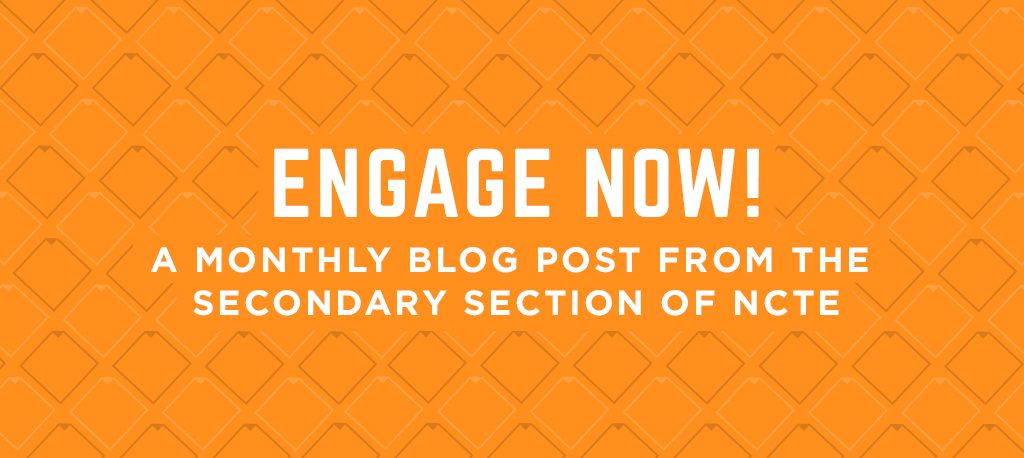From the NCTE Secondary Section Steering Committee
This post was written by NCTE member Shekema Silveri, Immediate Past Chair of the NCTE Secondary Section Steering Committee.
For this month’s Engage Now post, I sat down to talk with Lorena Germán, Chair of NCTE’s Standing Committee Against Racism & Bias.
Lorena is a Dominican-American educator working with young people in Austin, Texas. She has been published by NCTE, ASCD, EdWeek, and others. She was the recipient of NCTE’s Early Career Educator of Color Leadership Award and winner of NCTE’s Latinx Caucus Excelencia in Teaching Scholarship Award. She also co-founded the Multicultural Classroom, an organization seeking to support educators in developing a culturally sustaining approach to education. She’s a member of the Bread Loaf Teacher Network as well as #EduColor.
Lorena, you are an award-winning educator and activist. When you and I first met at NCTE’s 2018 Annual Convention in Houston, I was instantly struck by your humility and unflinching commitment to uplift and edify educators of color within our Council. Can you tell us a bit more about how you first became involved with NCTE’s diversity initiatives and what that work has meant to your praxis as an educator?
Thank you for noticing my efforts and dedication to uplift others. I do that because it was done for me. In every space I enter, I know that there was a fight at some point in order for me to stand there. These were all spaces built to exclude me, or at least built without me in mind. So, I learn from the strength and conviction of my/our ancestors and I work to uplift and edify educators of color.
I first became involved in this way within NCTE when I won the 2014 Early Career Educator of Color Award. That award, as I’ve shared before, was a turning point in my career. I was at a point where I was dealing with the trauma of where I had taught, and that recognition validated me, affirmed my passions, and showed me a clear way to move forward in my career. It pushed me to stay in education.
It also brought me in to a community, a team, a familia, doing work like the one I was doing. It became clear to me that there were many other educators of color who needed a door, a way to get in, and that is what I had to do. After being involved with NCTE for a while, I was contacted by the former chair of the Committee Against Racism and Bias, and she recruited me to join the committee. While I was hesitant at first, I realized that there was real movement and hunger for the work. I saw it as an opportunity to positively impact our profession. I joined, started some important initiatives, and today am the chair of the committee.
My experiences with NCTE have emboldened me to be honest and direct with students. I also feel empowered to teach what I know needs to be taught and to use my classroom as my activism space. This is where I’m working to change our country.
You also work with the phenomenal movement #EduColor, which is doing some amazing things in the activism space. Can you share a bit of EduColor’s platform and some of your hopes and dreams for your work in that space?
EduColor seeks to elevate the voices of public school advocates of color on educational equity and justice. It is an inclusive cooperative of informed, inspired, and motivated educators, parents, students, writers, and activists who promote and embrace the centrality of substantive intersectional diversity. EduColor is also an important collective in a field that is often isolating. We spend our days in classrooms with students and don’t always have time to build community with our colleagues.
When we are dedicated to equity and justice, that means we are working against the status quo and that often creates enemies and opposition among ourselves. This is where isolation comes in. EduColor offers the antidote. While we are spread throughout the country, we are united by our fight for justice, by our dedication to equity. My hopes and dreams for EduColor are broad. I am still new to the group and am learning about what the group wants for itself. I know that we are working toward offering alternate ways of schooling and producing knowledge that will inform those processes. I think that my wildest hope is that we will achieve major change in the landscape of education that directly benefits the most marginalized people in our country.
Like me, you’re a mom. When we met, you were nursing your son and carrying him along with you to meetings and events during the Convention. I was reminded of all the times I felt forced to choose between my children’s needs and those of the people I’ve been elected to serve. You reminded me that winning at BOTH is possible. Yet, I recall there being some backlash from members about your decision. If you’re willing, could you please take a moment to share how that experience has informed your approach to Maternal Activism (new terminology here!) moving forward?
Whew! That’s a tough and emotionally charged question for me. Winning at both is possible, but it shouldn’t be this complicated and taxing. I should not have had to hear backlash about bringing my baby to a conference about student voice. The irony of that is not lost on me, and the implications of the harm in those attitudes in our country’s classrooms is glaring to me. I think that my experience this year and in other spaces—because the backlash isn’t unique to our convention—, has revealed to me how important it is for mothers to stay professionally active. It’s obviously so rare that my presence was an anomaly.
Now, I understand that not everyone wants to do that, and I respect that and encourage mothers to move at their own pace. In my case, I love teaching; I love the Convention; and I have loved working on projects while home this year with my son. I shouldn’t have to choose. I should be able to grow professionally and to create. These experiences have empowered me to continue, to claim my space, to not be fearful of what I’m doing, and also to share support with other mothers. I mainly want to encourage them to press on, stay active, not feel as though they are outcasted and to believe that they are still important contributors to our society and profession.
Thank you so much for sharing your spirit with us, Lorena. Certainly, some things can be taught and/or passed down through the generations, but what you have—that internal compass of compassion—is greatness in human form. As a woman of color and your kindred, I am inspired by you and feel hope. As we close this interview, I wonder if you would mind giving us some of your greatest hopes, dreams, and aspirations for your children and ours. Finally, give us some calls to action to hold us accountable as educators and leaders.
Some of my greatest hopes and dreams are to see educators shift and grow to meet the needs of the young people sitting in front of us. I want to see schools that reject canned curricula and offer teachers autonomy, with preparation and support, in order to teach and nurture the whole child. I want to see a drastic and positive change in the English teaching force where more Black and Brown people become teachers.
I want to see more openness and willingness to revisit and reshape the literary canon. I want people to detach from the five-paragraph essay. I want teachers to give pencils and not use writing as punishment. I want the English field to be held accountable and for genuine change to spring from that. I want teachers to respect and honor the young Black and Brown students sitting in front of them, because like a young hoop-wearing and mini-skirt-rocking me, we are intelligent and knowledgeable and may be your next professional developer one day.
I really do believe change is possible. I really do believe that education is one of the main institutions that can bring about this change. We are literally shaping the future that will come to us. I want to see educators working diligently to re envision what teaching and learning look like. I want all of us to realize that our roles as knowledge bearers are politicized and the longer we shy away from that power, the longer inequity will exist. It doesn’t fall on us alone, but we are certainly at the core of it.
 Lorena Germán facilitates and leads #DisruptTexts, a crowdsourced, grass roots effort by teachers for teachers to challenge the traditional canon for a more inclusive, representative, and equitable language arts curriculum. Attend High School Matters on Saturday, November 16, at the 2019 Annual Convention in Baltimore to hear more, including roundtable experiences from a number of groups committed to anti-racist/anti-bias teaching pedagogy and practices. Learn more.
Lorena Germán facilitates and leads #DisruptTexts, a crowdsourced, grass roots effort by teachers for teachers to challenge the traditional canon for a more inclusive, representative, and equitable language arts curriculum. Attend High School Matters on Saturday, November 16, at the 2019 Annual Convention in Baltimore to hear more, including roundtable experiences from a number of groups committed to anti-racist/anti-bias teaching pedagogy and practices. Learn more.

Shekema Silveri is the Immediate Past Chair of the Secondary Section Steering Committee, in which she remains an active member. Shekema received the 2008 NCTE Educator of Color Leadership Award. A member of the award’s inaugural cohort, she later served as a program mentor (2010–2014). Shekema has also served on NCTE’s Executive Committee as Secondary Section Representative At Large (2014–2016). She is the Founder and Head of School at Atlanta’s Inspiring Future Educators (IFE) Academy of Teaching & Technology, where she teaches K–12 academic content with a focus on preservice teacher training. For more on Shekema Silveri or IFE Academy, please email her at ssilveri@myifeacademy.org.

